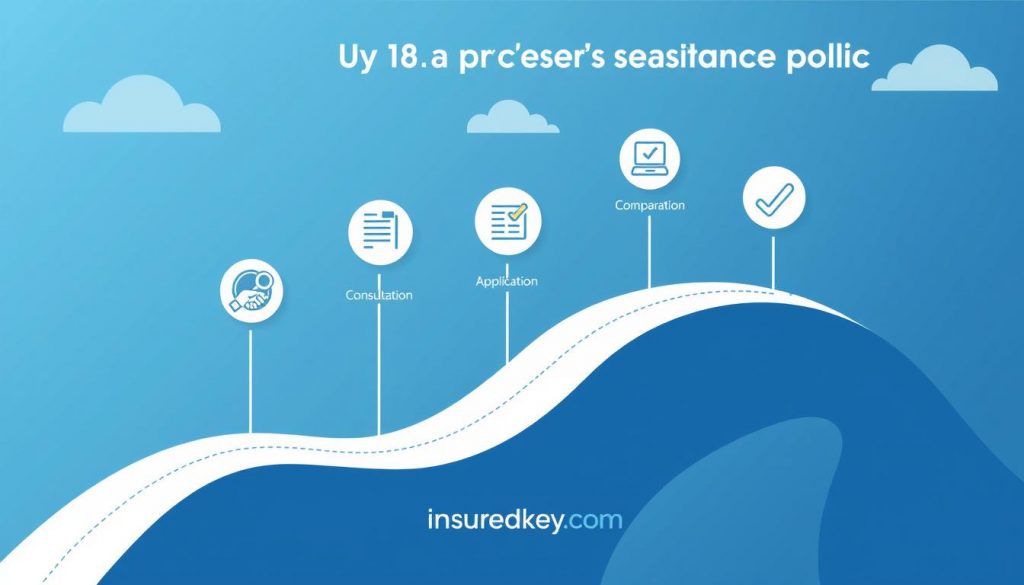Understanding the importance of an insurance policy is vital for your financial safety. An insurance policy is a legal agreement between you and the insurer. It outlines the terms of coverage, your duties, and the claims process.
With so many options, finding the right policy can be tough. It’s crucial to understand the details of different policies. This knowledge helps avoid problems when you need to file a claim. Whether it’s health, auto, or liability insurance, being informed can save you from unexpected costs.
Start by learning about the various types of insurance policies. This way, you can make a smart choice. Working with top insurance providers ensures you get the right coverage for your needs.
Key Takeaways
- An insurance policy is crucial for protecting your financial assets.
- Understanding your policy aids in smooth claim processes.
- Health insurance is more necessary than ever due to rising medical costs.
- Automobile insurance protects you from lawsuits resulting from accidents.
- Laying out policy coverage specifics can avoid future misunderstandings.
Understanding Insurance Policies
An insurance policy is a contract between you and the insurer. It outlines what’s covered in case of a loss. Knowing key terms helps you understand what’s included and what’s not.
What is an Insurance Policy?
An insurance policy is a formal agreement. It shows what risks are covered and important details like who’s insured and what’s covered. The Declarations Page is the first part. It gives you key information about your coverage.
Key Terms to Know
Knowing key terms in your policy is crucial. Here are a few important ones:
- Premium: The amount you pay for insurance coverage.
- Deductible: The out-of-pocket expense you must cover before your insurer pays for a claim.
- Exclusions: Specific situations or conditions not covered by your policy, including perils like flood or earthquake.
- Coverage Limits: The maximum amount an insurer will pay for a covered loss.
Types of Insurance Policies
There are many types of insurance policies. Here are a few common ones:
- Health Insurance: Covers medical expenses, including routine care, emergencies, and sometimes dental and vision.
- Auto Insurance: Protects against damages from accidents or theft, covering both personal injuries and property damage.
- Homeowners Insurance: Safeguards against perils affecting your home, theft, and damage to personal property.
- Life Insurance: Provides financial support to beneficiaries upon the death of the policyholder.
Reviewing the Definitions section in your policy can help. It clarifies terms and shows what’s covered. Knowing about different policies and exclusions helps you make better choices for your needs.
Types of Insurance Policies
It’s important to know about different insurance policies. They cover various aspects of life, like health, vehicles, homes, and rentals. Understanding these can help you choose the right protection.
Health Insurance Options
Health insurance is key for managing medical costs. In 2021, about 9.2% of Americans didn’t have health insurance. This shows how vital it is to have a good plan.
With costs rising, picking the right plan is crucial. You need to think about what’s covered and what you’ll pay out of pocket.
Auto Insurance Explained
Auto insurance helps you financially if you’re in a car accident. In the first nine months of 2022, there were nearly 31,785 traffic fatalities. This highlights the need for enough coverage.
It protects you from legal and repair costs. This is important for safe driving.
Homeowners vs. Renters Insurance
Homeowners insurance is vital for property owners. It covers the home and personal belongings. Renters insurance, on the other hand, protects renters’ items from theft or fire.
Figuring out the value of your belongings helps decide between homeowners or renters insurance. It depends on your situation.
Why You Need an Insurance Policy
Insurance policies are key to keeping your finances safe. They protect your assets from risks and unexpected events. This means you can face medical emergencies, legal troubles, or property damage without losing everything financially.
Protecting Your Assets
Insurance is like a financial safety net. It helps when you need it most. For example, health insurance pays for medical bills, and auto insurance covers accident costs. Whole life insurance also offers a death benefit and grows in value, helping with things like education or emergencies.
| Type of Insurance | Protection Offered | Benefits |
|---|---|---|
| Health Insurance | Medical expenses coverage | Access to quality healthcare |
| Auto Insurance | Repair/replacement costs | Peace of mind on the road |
| Homeowners Insurance | Property damage/loss | Protection from disasters |
| Whole Life Insurance | Death benefit coverage | Cash value growth, tax advantages |
Peace of Mind in Uncertain Times
Being ready for the unexpected gives you peace of mind. The right insurance lets you live without worrying about money troubles. It keeps you and your family safe from financial harm after accidents or surprises.
Legal Requirements and Insurance
Insurance also meets legal needs. For example, most states require auto insurance to cover accidents. Knowing these laws helps you avoid fines and keeps your finances secure.
Factors to Consider When Choosing a Policy
Choosing the right insurance policy is important for your financial safety. You need to think about the coverage amount, how much you pay for it, and the deductibles. Each part is key to making sure your insurance works well.
Coverage Amount
First, figure out how much coverage you need. This should match the value of what you want to protect. Think about your income, savings, debts, and what you spend on your family. If your coverage is too low, you might not be fully protected when you need it.
Premium Costs
The cost of premiums can change a lot between different companies. It’s smart to compare these costs and what you get for them. People who are younger and healthier usually pay less. Take your time to look at all your options to find a good balance between cost and coverage.
Deductibles and Copayments
Deductibles affect how much you pay out of pocket. A higher deductible means lower premiums but more upfront costs. Choose a deductible that fits your budget. This way, you can plan for possible claims without unexpected expenses.
| Factor | Low Impact | Average Impact | High Impact |
|---|---|---|---|
| Coverage Amount | Insufficient protection | Balanced protection | Comprehensive coverage |
| Premium Costs | Affordable | Manageable | Expensive |
| Deductibles | Low deductible | Medium deductible | High deductible |
Common Insurance Policy Exclusions
It’s important to know what your insurance policy doesn’t cover. Some situations could cause big losses, but your policy might not help. Learning about these exclusions helps you choose the right insurance.
Pre-existing Conditions in Health Policies
Health insurance often doesn’t cover pre-existing conditions. This means if you have a health issue before you get insurance, treatments for it might not be covered. This can really limit your access to healthcare.
Natural Disasters in Home Insurance
Home insurance usually doesn’t cover natural disasters. Flood damage, for example, is often not included. Also, earthquake and earth movement damage are not covered. Mold and pest infestations are usually excluded too.
Usage Limitations in Auto Insurance
Auto insurance has limits based on how you use your car. Using it for ridesharing or business might not be covered. Some dog breeds are also excluded from liability coverage. Knowing these limits is key to getting the right protection.
How to Compare Insurance Policies
Finding the right insurance policy takes careful attention to many options. Today, online tools make this easier. They let you compare different policies side by side, helping you choose wisely.
Online Comparison Tools
Online tools for comparing insurance are very helpful. They let you input your needs and see various plans from different companies. This way, you can see how rates differ, especially for auto insurance.
Getting Quotes from Multiple Providers
Getting quotes from at least three providers is key to finding the best rates. Your driving record and credit score can greatly affect your premiums. For example, rates can change a lot between drivers with clean records and those with DUIs.
Understanding Policy Language
It’s important to understand policy language when comparing. Policies often use technical terms that can change your coverage. Knowing these terms helps you ask the right questions and find the best policy for you.
The Role of Insurance Agents
Insurance agents are key in helping you find the right insurance. They connect you with top insurance providers. They make sure you get the coverage you need. Knowing when to talk to an agent and what they offer helps you make better insurance choices.
When to Consult an Agent
It’s wise to talk to an agent during big life changes or when you need to update your coverage. Here are some times to consider:
- Life events like getting married, having a child, or buying a home
- Changes in your money situation that make you rethink your coverage
- When you’re unsure about policy details or options
Benefits of Professional Guidance
Insurance agents do more than sell policies. They offer professional guidance for insurance. They help you understand your options and find the right fit. The main benefits are:
- Expert Advice: Agents teach you about different policies and benefits, helping you make smart choices.
- Time Savings: They handle the paperwork and details, saving you time.
- Ongoing Support: Agents help with renewals and claims, offering support all along.
Questions to Ask Your Agent
Getting the most from your agent means asking the right questions. Here are some to consider:>
- Ask about the policies available and what they cover.
- Find out about the differences between captive and independent agents and how it affects your choices.
- Learn about commission structures and how it impacts your costs.
- Ask for recommendations for coverage that fits your unique situation.
Steps to Purchase an Insurance Policy
Buying an insurance policy is a big step. It involves several key actions to find the right coverage for you. Knowing these steps can make the process easier and give you peace of mind.
Researching Your Options
Start by looking at different insurance types and comparing them. Use online tools to get quotes and see what’s out there. Check if the insurance company is stable, what coverage they offer, and the reputation of their agents.
This research is crucial. It helps you understand the application process and make smart choices.
Understanding the Application Process
Learn what you need to apply. You’ll likely have to share personal info like your age and health history. Some policies might need a medical check-up.
Insurance companies might also check your health records. Knowing this can help avoid delays and make the process smoother.
Finalizing Your Coverage
After picking your policy, review the contract carefully before signing. Make sure you understand all the terms and what’s not covered. Once you sign, pay your first premium to start your coverage.
Policy Maintenance and Review
Keeping your insurance policy up to date is key. Regular reviews help make sure it fits your current needs. Every year, check for any gaps in coverage and adjust for life changes.
When to Review Your Insurance Policy
It’s smart to review your insurance policy yearly. Big life events like getting married, having kids, or buying a home need a close look. These changes often mean you need more insurance to cover your new responsibilities.
Making Changes to Your Coverage
After reviewing your policy, you might need to make changes. If you find your coverage is too low, updating your insurance is vital. Making these changes early can greatly improve your financial security for you and your family.
Keeping Updated with Policy Changes
Stay on top of any policy updates from your insurer. Keep an eye on new coverage options and policy rules. This way, you can avoid using outdated policies and keep your protection strong and current.
| Life Event | Recommended Action |
|---|---|
| Marriage | Review beneficiary designations and combined coverage needs. |
| Birth of a Child | Update life insurance coverage to ensure adequate support. |
| Home Purchase | Reassess homeowners’ insurance for adequate property coverage. |
| Career Change | Evaluate health insurance and potential benefits changes. |
| Starting a Business | Consider additional liability coverage and business insurance. |
Tips for Lowering Your Insurance Premiums
Lowering your insurance premiums can make a big difference in your budget. There are many ways to save money. Here are some practical tips to help you.
Bundling Policies for Discounts
One smart way to save is by bundling your insurance. Companies like Amica and Liberty Mutual give discounts when you bundle auto and homeowners insurance. It’s easier to manage and can save you money.
Improving Your Credit Score
A good credit score can lead to lower insurance rates. Insurers see you as a lower risk, offering better deals. Improve your credit score to save on premiums. Check your credit report often and make changes as needed.
Taking Advantage of Discounts
Insurance companies offer many discounts. Look for ones for safe driving, good grades, or safe driving programs. For example, State Farm gives up to 30% discounts for safe drivers through their app. Always tell your insurer about any changes that might get you more discounts.
The Claims Process Explained
Understanding the claims process is key to a smooth recovery. Filing a claim involves several steps to get the right compensation. Each policy has its own rules, but knowing the basics helps a lot.
How to File a Claim
Start by telling your insurer about the incident right away. Most policies need claims filed within a year. Collect all needed documents, like damage photos and receipts. You’ll talk to an adjuster who will check the damage.
What to Expect During the Process
The claims process has five main steps, from reporting the loss to getting your money. The adjuster will look into the damage closely. They might even call in experts for a full check.
You might get separate checks for different damages, like your home and belongings. If your item is a total loss, the insurer will pay the policy limit.
Common Reasons Claims are Denied
Claims can be denied for many reasons. One big one is if the incident isn’t covered by your policy. Insurers also deny claims if you didn’t meet policy conditions or filed too late. Knowing your policy well can help avoid these issues.
Finding a Trusted Insurance Provider
Finding the right insurance provider is key to getting the best coverage. Start by looking at company reviews from independent sources. This will give you insights into what others have experienced. Trusted companies often have many testimonials, found in places like Burlington and Newark.
Researching Company Reviews
Reviews are crucial for understanding an insurer’s reputation. While many buy policies online, many still prefer independent agents. New Jersey has 367 such agencies, ready to help with your insurance needs.
Look at what others say about claims handling and customer support. This will help you choose wisely.
Checking Financial Stability
Financial stability is also important. Look for agencies with high financial strength ratings. For example, MassMutual and Guardian are known for their reliability.
MassMutual plans to give out over $2.5 billion in dividends in 2025. Choosing a financially stable company gives you peace of mind.
Customer Service Considerations
Customer service is also key. Many people value 24/7 assistance and in-person meetings. Check customer satisfaction ratings from sources like J.D. Power.
By focusing on these points, you can find a trusted insurance provider that meets your needs.
FAQ
What is an insurance policy?
An insurance policy is a legal agreement between you and the insurer. It outlines the terms of coverage, your responsibilities, and how to file claims.
Why is it important to understand my insurance policy?
Knowing your insurance policy is key to protecting your assets. It helps you understand what’s covered. Misunderstandings can cause problems when you file a claim.
What types of insurance policies are available?
There are many insurance policies out there. You can get health insurance, auto insurance, homeowners insurance, and renters insurance. Each one is designed for different needs.
How do I choose the right insurance policy?
To pick the right policy, look at the coverage amount, premium costs, and deductibles. Make sure it fits your needs for the best protection.
What are some common exclusions in insurance policies?
Some common exclusions include pre-existing conditions in health insurance. Homeowners insurance might not cover natural disasters. Auto insurance might have usage limits.
How can I compare different insurance policies?
You can compare policies online or by getting quotes from different providers. It’s also important to understand the policy language.
Should I consult an insurance agent?
Yes, talking to an insurance agent can help. They offer professional advice tailored to your needs, making policy complexities easier to handle.
What steps are involved in purchasing an insurance policy?
First, research your options. Then, understand the application process. Finally, sign the contract and pay your first premium to finalize your coverage.
How often should I review my insurance policy?
Review your policy regularly, especially after big life changes. This ensures it still meets your coverage needs.
What are some tips for lowering my insurance premiums?
To lower premiums, consider bundling policies for discounts. Improve your credit score. Also, ask your insurer about discounts you might qualify for.
How do I file an insurance claim?
To file a claim, quickly notify your insurer and provide needed documents. Be ready for an investigation. Know why claims might be denied.
How can I find a trusted insurance provider?
Look for a trusted provider by researching reviews and checking their financial stability. Also, evaluate their customer service to ensure a reliable experience.


